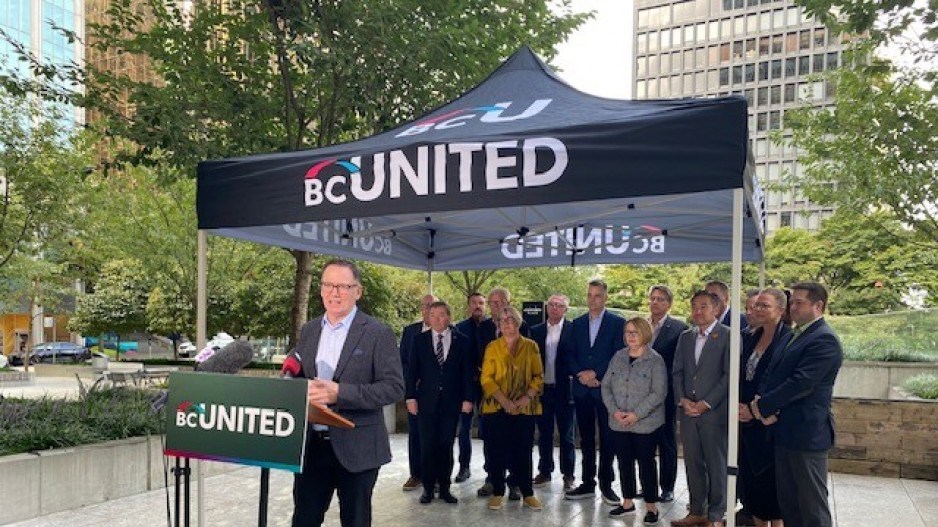Opposition leader Kevin Falcon says wildfire policy reforms unveiled by BC United includes plans to leverage local expertise — a strategy informed by the experiences of North Shuswap residents who stayed behind to fight the Bush Creek East fire despite evacuation orders.
The set of policy reforms was announced on Tuesday.
“We heard there is a lot of skill sets that local communities have,” Falcon said.
“We have to make sure that we are utilizing those skill sets, we're utilizing local contractors, we're utilizing those forestry contractors, for example, that often will see a small fire begin.”
In a news conference outside a Vancouver hotel, Falcon told reporters the BC United policy will include securing more frontline firefighting personnel, new fire suppression technology and an expanded a fleet of aircraft.
The reforms also include a pledge to offer automatic financial support for evacuees within the first 72 hours of leaving their homes.
Falcon said the party would also look to overhaul forest management practices, “emphasizing swift responses to fires and reducing wildfire risks through selective harvesting, interface firebreaks expedited permits, regulatory changes and financial incentives.”
The party’s policy reforms suggest using local contractors for rapid fire suppression, and equipping local volunteer fire response teams. Falcon said if there are people with local knowledge and expertise near a wildfire start who are capable and willing to respond to respond, they should be empowered to act.
“That's feedback that certainly the MLAs have heard from not just the Shuswap, but right across the province,” he said.
After tensions rose between officials and North Shuswap residents who defied evacuation orders to fight wildfires, training was provided for locals who wanted to help on the fire line.
At the time, the BC Wildfire Service noted there have been multiple examples of collaborative efforts where wildland firefighters have battled fires alongside community groups, including Knutsford ranchers battling the Rossmoore Lake wildfire, south of Kamloops.
Todd Stone, MLA for Kamloops-South Thompson, said ranchers, farmers, loggers and other multi-generational residents know the geography and wind patterns of the region, and many of them have firefighter training.
Stone said instead of blaming locals for endangering their lives by disobeying orders, that knowledge needs to be leveraged.
“What we're saying is, this whole system needs to be turned upside down, and we need to actually equip and train and supply those locals ahead of fire seasons,” Stone said.
Stone said during this year’s wildfire season, evacuees have also experienced delays and backlogs in receiving supports.
“There's a lot of red tape requirements that are wrapped around evacuees having to prove their financial status and a whole bunch of other details,” he said.
“What we're saying is in that initial 72 hours, when a family presents at an ESS, they will be automatically approved for the basic food supports accommodation supports for that initial 72 hour period so that they can begin to kind of take stock of what's going on.”
Falcon said there isn’t a budget or detailed costing attached to the policy at this time, noting obtaining this information as an opposition party is difficult, but pointed to the massive costs of this year’s historic wildfire season.
“That's part of what climate resiliency should be be all about, making these productive investments upfront so that we don't have those huge costs down the road,” he said.




